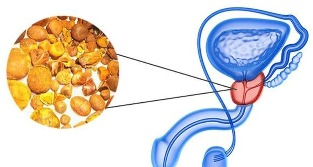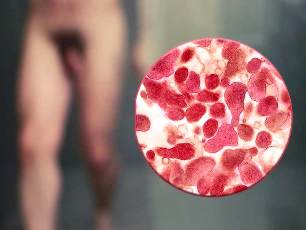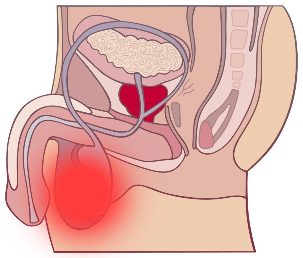Many people are interested in what the prostatitis. This term is understood the inflammatory damage to the prostate gland, which often occurs in men after 35 years.

If not immediately start treatment of the disease, high probability of complications in the sexual and reproductive region.
The essence of pathology
This term is understood inflammation of the prostate. It is a common urological violation. According to statistics, it occurs in 50 % of men after 50 years.
The prostate is a glandular-muscular organ that is localized around the urinary tube. She is responsible for the synthesis of secretions that combine with seminal fluid and maintain normal activity of sperm. This helps to protect them from the harmful effects of external factors.
Prostatitis can be acute and chronic. In the first case, the body get harmful bacteria – Proteus, Escherichia coli, Klebsiella and other microorganisms. Infection occurs through the urethra, the flow of blood or lymph.
Reasons
There are many factors that cause the appearance of inflammation. The main causes of prostatitis include the following:

- Violation of blood circulation. This causes an increase in size of the prostate. Cause of problems is lack of exercise and excess body weight;
- Infectious diseases. Infection often occurs due to urethritis or gonorrhea. In more rare cases, aggravating factors are flu, tonsillitis, tuberculosis;
- Bacterial inflammation. Cause of problems is the penetration of infection into the prostate. This can happen through the bloodstream, with lymph or during sexual intercourse. Cause of problems can be the bacteria that live on the surface of the human body or in the abdominal cavity;
- Traumatic lesions of the pelvic organs. Also, the reason often is the disruption of blood flow in the area. That is why prostatitis is often develops in drivers who are exposed to vibration;
- Hypothermia and low physical activity. Precipitating factor there may be chronic disease of the genitourinary system, hormonal imbalance, lack of systematic sex. The cause can be urinary retention;
- The lack of exercise. Lack of physical activity negatively affect the function of endocrine organs, heart and blood vessels, nervous system. This process is accompanied by disorders of blood circulation in the pelvic organs. During hypoxia of the tissues of the gland to create the conditions for active reproduction of pathogenic microorganisms. These factors provoke the development of prostatitis;
- Direct inflammatory damage of the intestine or urethra. This violation provokes a secondary infection of the prostate. It can be upward or downward;
- Chronic constipation. Repeated violations of the chair involve inflammatory changes in the body.
The key causes of the disease include urological infections and several venereal diseases. This category includes urethritis, gonorrhea. Triggers can be even such disorders as chronic bronchitis, caries, sore throat.
Types of prostatitis

The symptoms of prostatitis are directly dependent on the variety. Doctors distinguish a number of varieties of disease, each of which is characterized by certain features.
Bacterial
This form of the disease is usually diagnosed in 21-43 years. In this case, the main signs of inflammation of the prostate include a significant increase in the temperature, it can rise up to 40 degrees. Also, people have General weakness, chills, impaired urination.
Often patients suffer from erectile dysfunction, pain in the perineum, purulent and bloody impurities in the urine. The chronic form of the disease has milder symptoms. However, when relapse of the disease symptoms of prostatitis increase.
Calculous
The main manifestations of the disease include pain in the pelvis, sacrum and perineum. The discomfort increases in motor activity of the body. The disease is characterized by a violation of urination, spotting impurities in the urine, increased irritability, weakening of erection.
Stagnant
For this form of the disease characterized by a chronic course. The disease develops when impaired blood flow in the pelvic organs. Also, the cause may be the stagnation of secretions in the prostate. Usually it is observed in the absence of sexual intercourse.
For this form of disease are inherent problems with urination. Also the person experiences uncomfortable sensations in the testicles and groin. It can increase temperature, impaired erection develops depression.
Purulent

This term is understood as one of types of acute bacterial form of the disease. For purulent prostatitis is characterized by a significant increase in temperature to 40 degrees. Also, a person observed purulent impurities in the urine, impaired urination, causes marked pain in the perineum and inguinal area.
Symptoms
The symptoms of inflammation of the prostate depending on the stage of pathology:
- Catarrhal. In this case, the person has symptoms of frequent urination. Also have pain when emptying the bladder. The patient experiences discomfort in the perineum and sacrum.
- The follicular. Pain syndrome becomes more pronounced, sometimes giving in the anus and increases during defecation. This disease stage is accompanied by a violation of urination. In men urine flows in a thin stream. Sometimes there is a delay of urine, a little fever.
- Parenchymal. It is characterized by symptoms of intoxication, a significant increase in temperature to 38-40 degrees, the condition of chills. In humans, there are problems with urination and observed sharp pains in the perineum. Often disturbed defecation.
If time does not treat the pathology, there is chronic prostatitis. It is characterized erased the clinical picture. In rare cases, temperature increases to subfebrile values.

Quite often, the pathology is a consequence of chronic inflammation, which is associated with infection of a specific infection. It could be gonorrhea, Ureaplasma, Trichomonas. In this case, there may be a small discharge from the urethra, mild pain in the area of the perineum, the growing discomfort when urinating.
The chronic form may be accompanied by a burning sensation in the perineum and urethra. In humans, there is no excessive fatigue, sexual disorders, dysuria. If you have problems with potency man is facing mental depression, increased anxiety, irritability.
Pain syndrome
The prostate does not contain pain receptors. Provoking discomfort factor is involvement in the anomalous process of the nerve fibers. People with chronic form of the disease have pain of varying severity – from mild to very intense.
Syndrome pain changes its intensity during sexual abstinence, ejaculation or excessive sexual activity. The discomfort radiates to the sacral area, perineum and scrotum. Sometimes it is felt in the lumbar area.
Dysuric syndrome
Inflammation provokes an increase in the size of the prostate, which leads to compression of the ureter. Its lumen becomes smaller. In humans, there is increased frequency of urination. Also, there is a feeling of incomplete emptying of the organ.
Dysuric disorders usually manifest at the early stages of the disease. After this, there is compensatory hypertrophy of the muscles of the bladder and ureters. At this time the signs are dysuria decrease. Pri decompensation these mechanisms they again increase.
Diagnosis

To detect inflammation of the prostate, you must consult a urologist. Clinical picture pathology can determine the disease and even the stage of its development. Inflammation and enlargement of the size of the prostate gland can then be visualized using ultrasound.
Key diagnostic procedures include the following:
- Palpation of the prostate, the manipulation is performed by a urologist;
- Various studies of urine – General, cytological, bacteriological;
- Microscopic examination of seminal fluid;
- Smear from the urethra – secretion analysis is performed to assess the composition of the microflora;
- Analysis of the content of the DOG during the manipulations to assess specific protein of the prostate.
In most cases, this manipulation is sufficient. In the presence of difficulties with diagnosis is performed urodynamic study. For this man hospitalitynet.
In more rare cases, be cytoscopy. This procedure is not only used for diagnostic purposes. It can be therapeutic. Ensures internal examination of the bladder and urethra. If there are no damages there is no need to carry out the procedure.

Treatment
Methods of treatment of prostatitis tailor the shape and characteristics of the flow of the disease. Acute prostatitis is accompanied by severe intoxication, fever, a violation of health.
In this case, the patient requires immediate hospitalization. He shows the introduction of antibiotics intravenously. Other forms of prostatitis the need for such therapy is missing.
Drug therapy
For bacterial form of disease, it is recommended to use antibacterial drugs. If the cause of the disease is not the bacteria are the such methods will not give the desired results.
Antibiotics used to treat almost all acute infections. Drugs in the acute form of the disease is selected based on data from diagnostic studies. The doctor determines the specific kind of microorganism that triggered the pathology, and the degree of its sensitivity to drugs.
To cope with the constant pain in the pelvic area and the perineum, shows the use of muscle relaxants and alpha-blockers. With the help of spasmolytic and alpha-blockers are able to relax the muscles of the affected organ and the bladder. This facilitates the excretion of urine and to cope with the symptoms of the disease.
To eliminate the protective muscle tension, eliminate tightness inflamed prostate and reduce pain your doctor may prescribe muscle-relaxing drugs.

In difficult situations, you cannot do without the introduction of intravenous fluids and use of diuretics. Due to such therapy fails to stimulate excretion of urine, which helps to avoid intoxication. This treatment prevents the occurrence of ascending infection in the urinary bladder.
To eliminate the signs of non-bacterial form of the disease prescribe analgesic drugs, antipyretic drugs, anticholinergics. In the case of chronic constipation you need to use softening laxatives. An effective remedy is mineral oil.
Even with the elimination of the main symptoms of acute bacterial disease important therapy completely. If you stop the therapy early, a high probability of chronicity of the process. Subsequently prescribed maintenance treatments.
In some cases, the development of disease need to follow a special diet. It is to eliminate spicy and fatty foods. It is also necessary to abandon caffeine. Under the ban are and acidic drinks.
On the condition of the men has a positive effect a systematic ejaculation. It provides drainage of prostate secretions. In acute violation of urination impose a temporary suprapubic fistula. May be performed catheterization.
Surgery
Surgery is recommended in the absence of effect from use of medicines. It is also an indication for surgical treatment of the prostate is blocking the flow of urine prostate. It is worth considering that young patients such a method is not prescribed because it can cause infertility.

There are several types of surgical intervention:
- Transurethral resection of the body – it involves removal of all affected tissues;
- Prostatectomy procedure involves removal of the prostate and surrounding tissue. In the course of manipulation to carve and seminal vesicles. It is quite a complex intervention that often cause impotence and may cause incontinence.
The consequences
If time does not begin treatment, there is a risk of dangerous health effects. First of all, prostatitis is a dangerous development abcess. In the formation of purulent lesions of the prostate greatly increases the temperature. The heat gives way to symptoms of chills.
Sharp pain in the perineum leads to a violation of urination and defecation. Increase swelling of the prostate causes serious problems with urination.
In more rare cases there is self-opening the abscess, after which its contents enters the intestine or urethra.
The spread of infectious pathogens in chronic disease provokes the occurrence of cystitis and pyelonephritis. Frequent consequences of pathology include inflammation of the testicles and their appendages. There is also the risk of vesiculitis, which is an inflammation of the seminal vesicles. As a result of these processes is often observed reproductive damage.

Prevention
To prevent the appearance of inflammation or relapse of chronic disease, you need to follow these recommendations:
- To reduce the amount of alcohol consumed;
- Systematic exercise;
- To avoid hypothermia;
- To stop Smoking;
- To avoid stressful situations;
- Time to treat inflammation, particularly for sexually transmitted infections;
- To take a contrast shower;
- Avoid lifting heavy objects;
- Use barrier methods of contraception;
- Systematically to have sex;
- To take vitamin supplements;
- To strengthen immunity;
- Twice a year to visit a urologist;
- Correct and balanced nutrition.






























